– January –
On January 20, Donald Trump is inaugurated as the 47th president of the United States. Rabbi Ari Berman, the president of Yeshiva University, delivers a benediction asking God to “guide our schools and college campuses, which have been experiencing such unrest,” and to “hear the cry of the hostages, both American and Israeli, whose pain our presidents so acutely feel.”
Later that afternoon, Elon Musk addresses a Trump rally at Capital One Arena in downtown Washington, D.C. He makes two stiff-armed gestures to the crowd that match the Nazi sieg heil salute, but which the Anti-Defamation League calls “an awkward gesture in a moment of enthusiasm.”
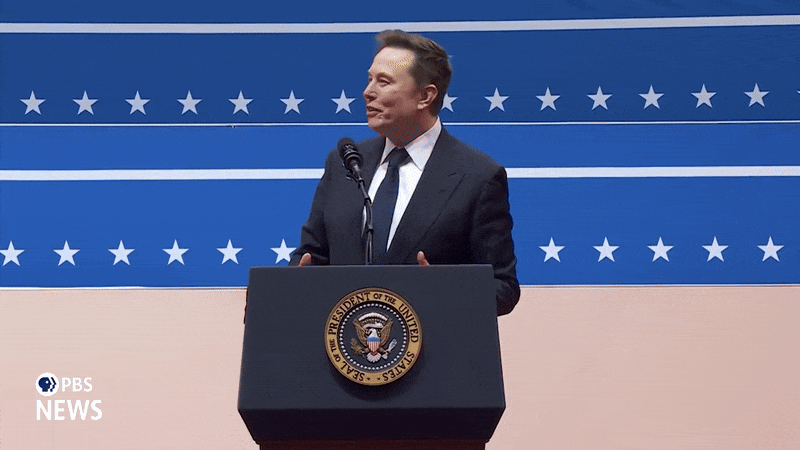
Trump signs an executive order creating the Department of Government Efficiency and places Musk in charge of the agency, which has a broad mandate to slash spending and reshape the federal government.
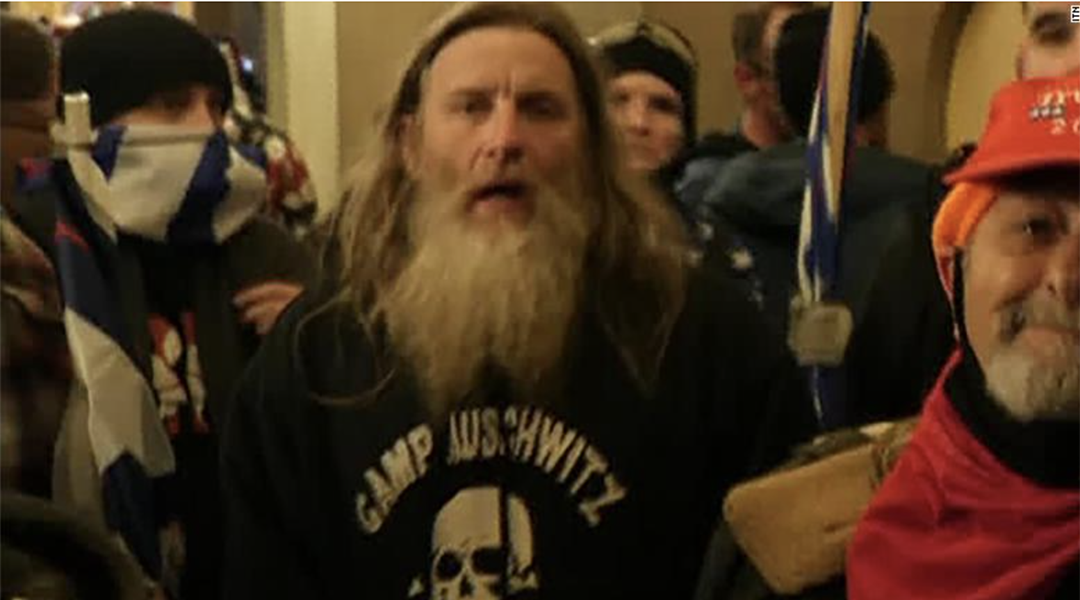
Trump also pardons hundreds of individuals convicted of crimes related to the Jan. 6, 2021, riot at the U.S. Capitol, including Robert Keith Packer, who broke into the Capitol wearing a black hoodie reading “Camp Auschwitz” over an SS skull logo, and Timothy Hale-Cusanelli, who the Justice Department described as a white supremacist who hurled antisemitic slurs at police officers that day.
Ed Martin, who praised Hale-Cusanelli as an “extraordinary man” and “extraordinary leader,” is appointed as acting United States attorney for the District of Columbia and quickly fires and demotes prosecutors who had worked on Jan. 6 cases. Martin later apologizes for praising Hale-Cusanelli, saying he was unaware of the full range of his antisemitic comments.
Sebastian Gorka, a conservative commentator with past ties to a Nazi-aligned Hungarian group, returns to the White House as senior director for counterterrorism. Gorka, whose nomination was announced in November, is the first of many appointees with ties to far-right and white supremacist groups.
Trump lifts sanctions on dozens of far-right Israeli settlers and organizations that the Biden administration accused of extremist violence against Palestinians.
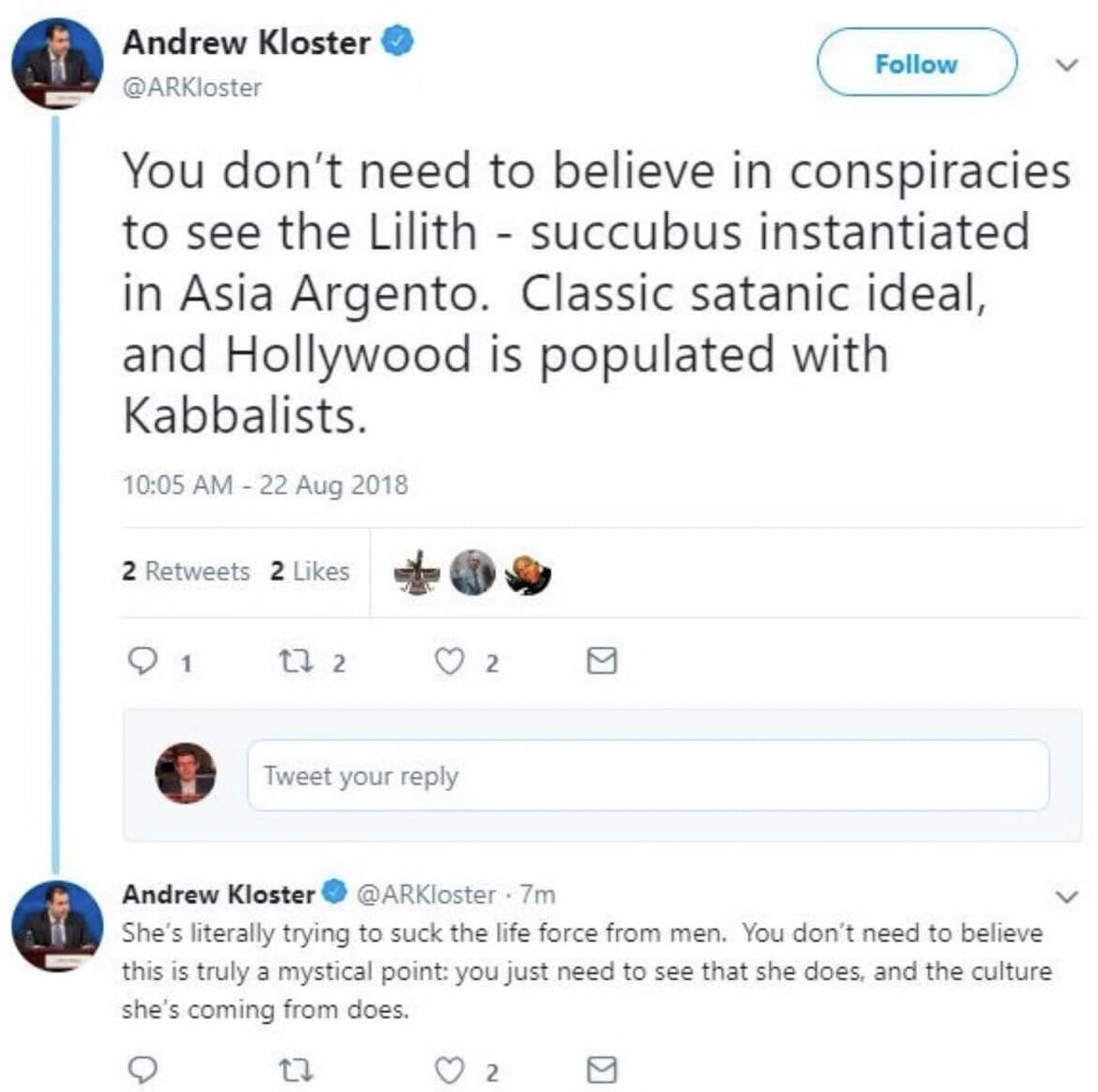
On January 21, the Office of Personnel Management, which oversees the federal workforce, announces Andrew Kloster as its new chief counsel. Kloster, a self-described “raging misogynist,” once claimed on Twitter that “Hollywood is populated with Kabbalists” who are “trying to suck the life force from men.”
On January 23, Musk — who never directly denied that he had performed a Nazi salute — posts a series of Nazi-related puns on X, including “Don’t say Hess to Nazi accusations!” and “Bet you did nazi that coming 😂.”
This time the ADL scolds Musk: “The Holocaust is not a joke.”
On January 25, Trump lifts a hold placed by former President Joe Biden on the delivery of 2,000-pound bombs to Israel.
On January 27, the Office of Management and Budget issues a memo freezing all federal grants, including nonprofit security grants for Jewish institutions administered through FEMA. Synagogues and other Jewish organizations report that they stop receiving reimbursements for previously approved expenses.
The Secure Community Network, the security arm of the Jewish federations network, says it expects the funds to eventually be released but has no idea when that will happen. SCN previously endorsed Kristi Noem, Trump’s pick to run the Department of Homeland Security, which manages the grants.
“Jewish families — past and present, here and elsewhere — know what it is to live in fear for the immediate and long-term safety of our families.”
Letter from dozens of Jewish organizations to TrumpJanuary 27, 2025
Dozens of Jewish organizations — including synagogues and community relations councils from across the country — sign a letter protesting Trump’s mass deportation plans, a signature part of his campaign platform that seeks to abolish birthright citizenship and remove millions of undocumented immigrants from the country. “Jewish families — past and present, here and elsewhere — know what it is to live in fear for the immediate and long-term safety of our families,” the letter says.
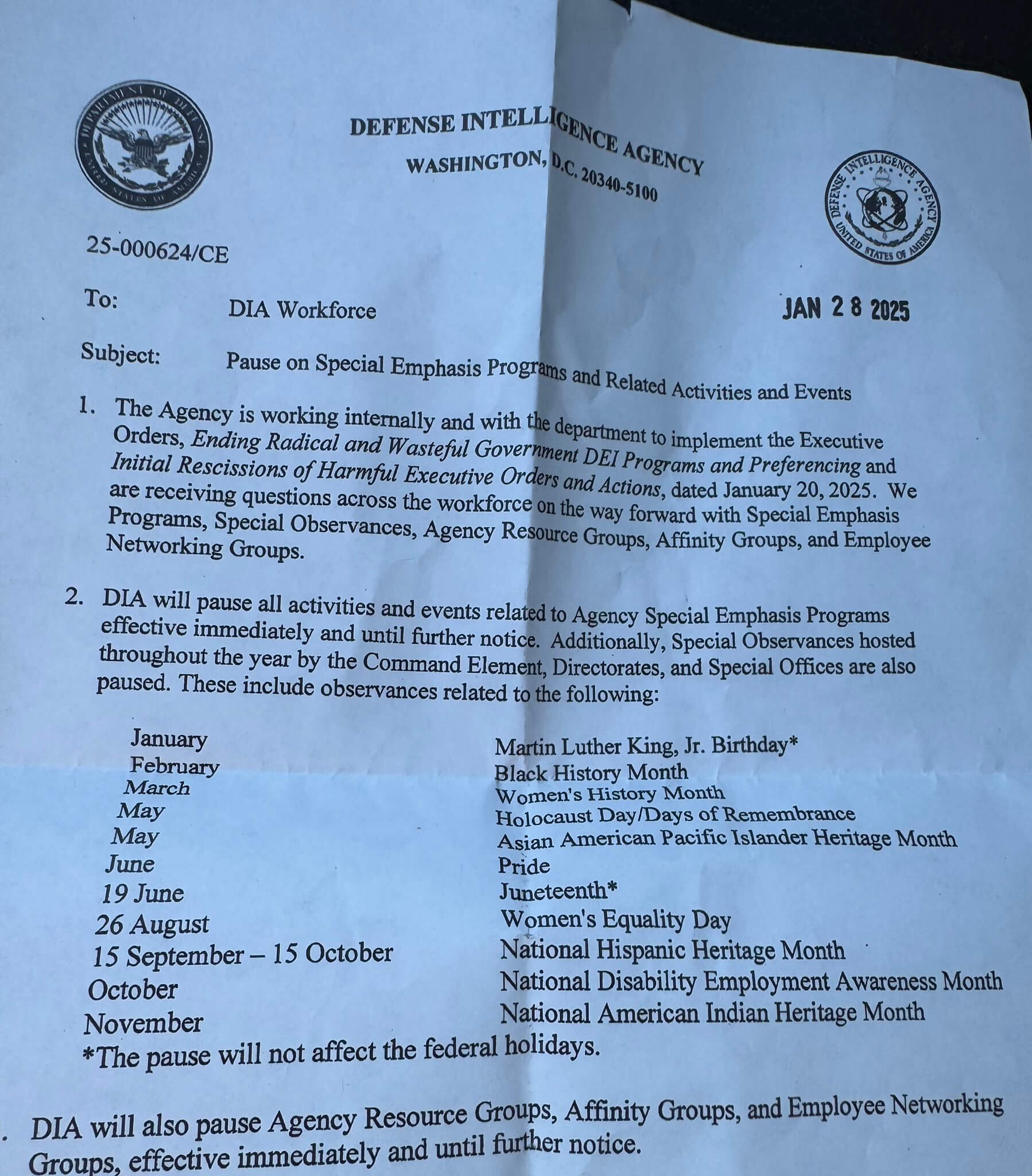
On January 28, the Defense Intelligence Agency distributes a memo announcing that it is pausing the observance of Holocaust Days of Remembrance and other cultural events to comply with an executive order banning “diversity, equity and inclusion” programs in federal workplaces.
Defense Secretary Pete Hegseth eventually announces that the entire Pentagon will no longer observe the Days of Remembrance or other initiatives falling under the umbrella of “diversity, equity and inclusion” because they “erode camaraderie and threaten operation performance.”
“It shall be the policy of the United States to combat anti-Semitism vigorously, using all available and appropriate legal tools, to prosecute, remove, or otherwise hold to account the perpetrators of unlawful anti-Semitic harassment and violence.”
Additional Measures to Combat Anti-SemitismJanuary 29, 2025
On January 29, Trump signs an executive order outlining “Additional Measures to Combat Anti-Semitism,” relying on a hyphenated spelling of “antisemitism” out of step with most Jewish groups. The order targets “leftist, anti-American” universities and directs federal agencies to order schools to “monitor” and “report activities” by foreign students, staff and faculty.
The American Jewish Committee “welcomes” the focus on antisemitism and the administration’s pledge to deport visitors “on temporary work or student visas who have been found to provide material support or resources to designated terror organizations.”
In the coming weeks, Secretary of State Marco Rubio will begin canceling thousands of student visas in the name of fighting antisemitism.
Robert F. Kennedy Jr., Trump’s nominee for secretary of health and human services, acknowledges during his confirmation hearing that he had previously compared children with autism in the U.S. to the victims of “Nazi death camps.”
On January 30, 275 rabbis and cantors sign a letter complaining about a statement from the SCN calling on Trump to deport “any non-citizen alien who supports terrorism.”
“We need you to continue doing your crucial work to help keep Jewish communities safe. Perpetuating fear of immigrants and promoting the corrosion of the rule of law undermines this mission,” clergy write in the letter, organized by T’ruah.
Dana White, the UFC CEO, announces that he will not sanction a fighter in his mixed-martial arts league who praised the Nazis. Bryce Mitchell launched his show days earlier by saying that, based on his own research, “Hitler was a good guy.”
“He fought for his country. He wanted to purify it by kicking the greedy Jews out that were destroying his country and turning them all into gays,” said Mitchell, who also denied the Holocaust.
White, who spoke at Trump’s inauguration rally, said he was “beyond disgusted” by Mitchell’s comments but the UFC would not take any disciplinary action against him.
– February –

On February 3, Trump nominates Joe Kent to run the National Counterterrorism Center. “This guy is, I’m not going to say neo-Nazi, but as close as you can get to that without being labeled that,” says former U.S. Rep. Adam Kinzinger, an Illinois Republican. Kent, a former Green Beret, previously appeared in a YouTube video with a neo-Nazi and met with Nick Fuentes, a white supremacist and Holocaust denier. A photo later emerges of “PANZER,” the German word for tank, tattooed on Kent’s bicep.
Darren Beattie, a former Trump speech writer who was previously fired for speaking at a white nationalist conference, is appointed as the acting under secretary for public diplomacy and public affairs at the State Department.
Trump also names Leo Terrell, a Black civil rights attorney, as the head of an interagency task force on antisemitism that includes Ed Martin, the acting U.S. attorney who praised an alleged white supremacist.
Terrell blamed Trump for the rise in antisemitism as recently as 2020, but following his Republican conversion to “Leo 2.0” and the outbreak of the Israel-Hamas war, he became fixated on antisemitism related to protests against Israel.
“He’s just a great guy and a real mensch and cares deeply, deeply, deeply,” says Dov Hikind, who runs Americans Against Antisemitism. “I never asked him, like, ‘Where does this come from?’ — that of all the people in the world, he’s going to be playing this role in the Justice Department — but he’s just a good guy.”
Terrell subsequently says that he also wants to pursue a task force on “anti-white bias, all this DEI nonsense, the attack on Christians, the attack on Catholics.” After the president says that Senate Minority Leader Chuck Schumer has “become a Palestinian” and “isn’t Jewish anymore,” Terrell shares a social media post from a white supremacist who wrote that “Trump has the ability to revoke someone’s Jew card.”
The Department of Education opens investigations into allegations of antisemitism at five universities, including Columbia.
The Department of Health and Human Services announces it is investigating the medical schools at Harvard, Columbia, Brown and Johns Hopkins for antisemitism related to protests against Israel at their commencement ceremonies last spring.
This series of investigations will ultimately lead to the suspension of billions of dollars in federal funding to Harvard and Columbia, and the threat of more grant revocations to other schools.
On February 4, Trump says during a news conference at the White House with Israeli Prime Minister Benjamin Netanyahu that the U.S. plans to “take over” the Gaza Strip, remove its Palestinian residents and develop it as the “Riviera of the Middle East.”
He later shares an artificial intelligence-generated video showing a “Trump Gaza” resort in the seaside enclave.
“Trump Gaza”.
Yes, President @realDonaldTrump did just post this Gaza AI video on his social media platforms. And yes it does include this image of him and PM Netanyahu. pic.twitter.com/l40bBkV5P0
— Arsen Ostrovsky 🎗️ (@Ostrov_A) February 26, 2025
Trump had previously said he wanted Jordan and Egypt to accept Palestinians living in Gaza, which those countries oppose.
On February 6, Trump creates a Task Force to Eradicate Anti-Christian bias led by Attorney General Pam Bondi and including other senior cabinet members.
On February 10, the Department of Defense releases a memo announcing that it will be purging books from schools it runs for the nearly 70,000 children living on military bases. Among the books removed is a biography of Ruth Bader Ginsburg, pulled from shelves to comply with Trump’s executive order titled “Defending Women from Gender Ideology Extremism.”
On February 11, the Reform, Conservative and Reconstructionist movements sue the Department of Homeland Security to prevent immigration raids at synagogues and other houses of worship.
Sen. Ted Cruz releases a database of “woke DEI grants” that includes funding to study the linguistic differences between Hebrew and English.

On February 13, Vice President JD Vance tours the Dachau concentration camp in Germany with his wife, Usha. “It is something that I’ll never forget,” Vance says.
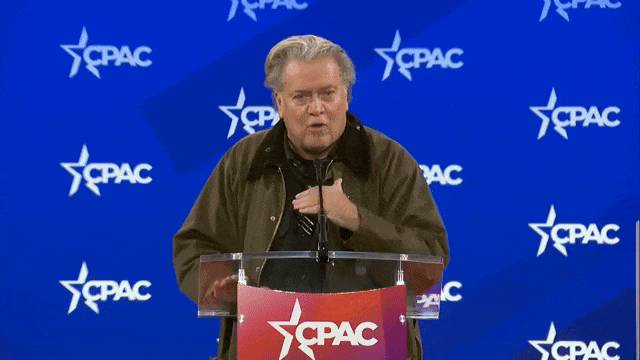
On February 20, Steve Bannon, a former top adviser to Trump, makes a stiff-armed salute that resembles the Nazi gesture at the Conservative Political Action Conference. Days later Israel365 Action, an Orthodox advocacy group, will honor Bannon with the “Warrior for Israel” award. “I’m one of the most pro-Israel people out there,” Bannon will tell the group.
On February 23, Trump names Dan Bongino, a conservative ex-Fox News host, to be deputy director of the FBI. Bongino has frequently blamed George Soros for funding the “deep state” and posted about Soros dozens of times since 2022.
“Whenever they throw out the ‘anti-Semitic’ conspiracy theory it tells you that they’re worried about what Soros is up to.”
Dan Bongino, deputy director of the FBIApril 18, 2023
On February 25, Trump issues a memo directing the Justice Department to revoke security clearances held by members of Covington & Burling and taking other actions against the law firm, which worked with Special Counsel Jack Smith during his time investigating Trump during the Biden administration. It is the first of at least six actions against law firms that Trump believes treated him unfairly.
Eight major law firms, including Paul Weiss, Skadden, and Willkie Farr & Gallagher, reached settlements with the Trump administration pledging more than $500 million in pro bono legal work on behalf of Trump administration priorities, including fighting antisemitism.
Former second gentleman Doug Emhoff, who is Jewish, now works for Willkie and says he opposed the deal.
On February 28, the Federal Task Force to Combat Antisemitism announces it will visit 10 campuses “that have experienced antisemitic incidents since October 2023.”
– March –
On March 1, Secretary of State Marco Rubio expedites the delivery of $4 billion in military assistance to Israel. “It is a welcome sign that the United States remains committed, absent qualification or caveat, to the Jewish state’s ability to defend itself and maintain a qualitative military edge in the wider Middle East,” the Conference of Presidents of Major American Jewish Organizations says in a statement.
On March 4, Adam Boehler, a senior hostage negotiator for the Trump administration, breaks longstanding U.S. policy by meeting directly with Hamas officials to secure the release of an American-Israeli hostage in Gaza. The talks are unsuccessful and Boehler, who was Jared Kushner’s college roommate, faces outcry from Israeli officials for saying of Hamas negotiators that “every piece of a person is a human,” and that he sought to find shared humanity during the meetings.
“We’re the United States, we’re not an agent of Israel,” Boehler tells CNN.
On March 5, popular podcast host Joe Rogan interviews Ian Carroll, a self-described independent researcher who has spread antisemitic conspiracy theories, including that Israel was responsible for 9/11 and that the U.S. is controlled by a “Zionist mafia.” Rogan, whose podcast has around 20 million listeners, endorsed Trump for president and hosted Musk on the show a week before Carroll.
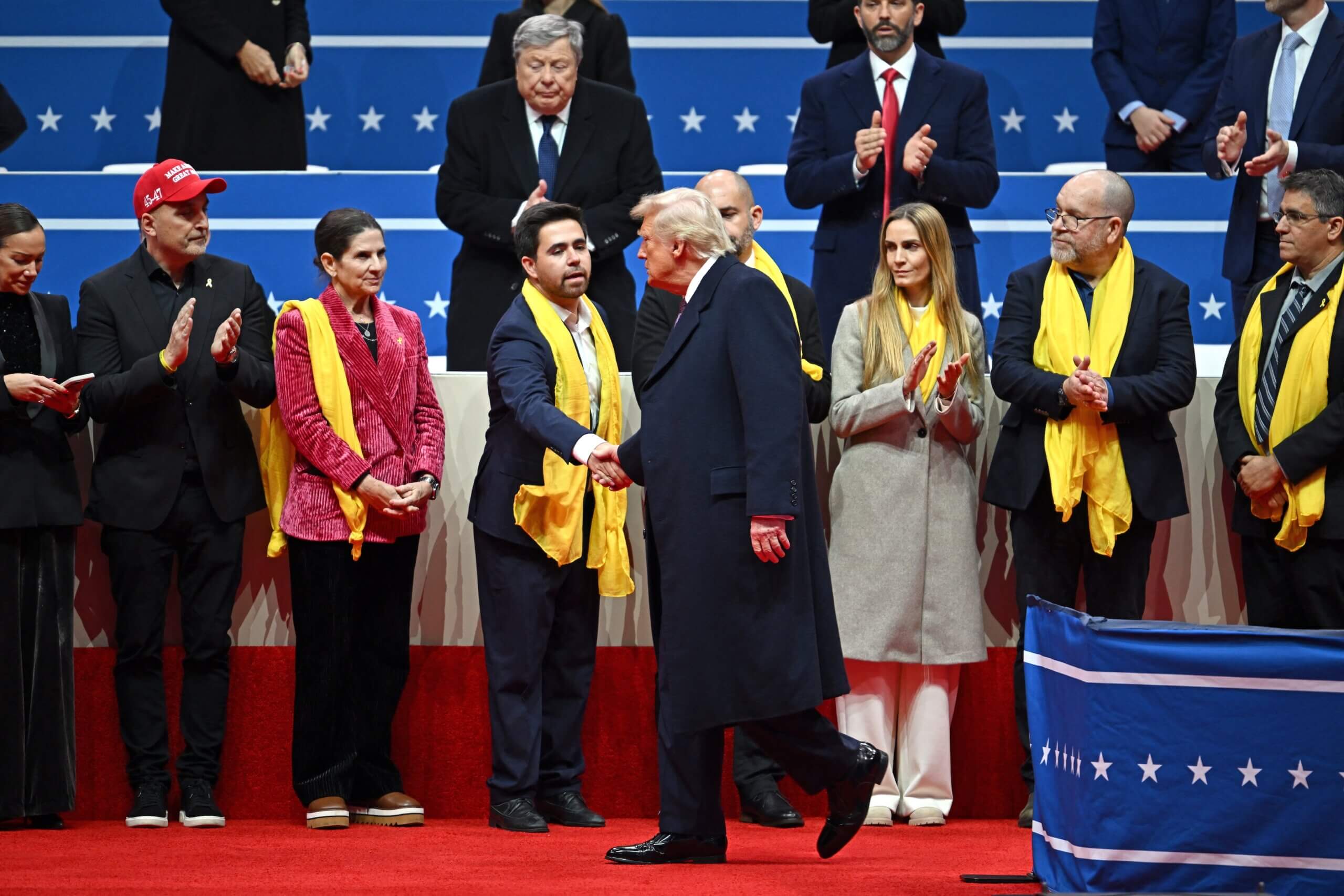
On March 6, Trump hosts a delegation of freed Israeli hostages in the Oval Office. “We’ll get them out,” Trump says of the 59 hostages believed to be remaining in Gaza. He later posts “Shalom Hamas” on social media and says the terrorist group will be “DEAD” if they do not release the hostages.
“Today, we demonstrate to Columbia and other universities that we will not tolerate their appalling inaction any longer.”
Linda McMahon, Education SecretaryMarch 7
On March 7, the Trump administration announces that it has canceled $400 million in federal funds to Columbia University over allegations that the school has failed to sufficiently address antisemitism. “For too long, Columbia has abandoned that obligation to Jewish students studying on its campus,” says Education Secretary Linda McMahon.
ADL chief Jonathan Greenblatt says the move is a warning shot and that other schools should “think twice rather than letting these protests continue to go unchecked.”
On March 8, plainclothes Immigration and Customs Enforcement agents arrest Mahmoud Khalil in the lobby of Columbia University housing. Khalil, a recent graduate of the school and a permanent resident of the U.S., was a leader of the pro-Palestinian protest movement on campus. Trump administration officials offered shifting justifications for his arrest, with Rubio ultimately stating that his continued presence in the country was contrary to the U.S.’s foreign policy priority of opposing antisemitism. A federal judge temporarily blocked Khalil’s removal from the country.
The move comes after Khalil participated in a protest at the Barnard library days earlier and Ross Glick, a former leader of Betar US, a far-right Jewish group, shared his name with members of Congress.
SHALOM, MAHMOUD.
“ICE proudly apprehended and detained Mahmoud Khalil, a Radical Foreign Pro-Hamas Student on the campus of @Columbia University. This is the first arrest of many to come.” –President Donald J. Trump pic.twitter.com/gfuPd0tskf
— The White House (@WhiteHouse) March 10, 2025
“Shalom Mahmoud,” the White House posts on social media after his arrest, as it increasingly leaned on the Hebrew word as a catchphrase in its messaging around Israel and antisemitism.
Many Jewish organizations respond by condemning Khalil’s politics even as they express concern about the arrest. “We must defend US Constitution without defending Khalil’s vile, antisemitic, anti-American ideology,” Zioness says in a statement.
Federal officials will later admit they did not have an arrest warrant for Khalil when they took him into custody, as he stood beside his pregnant wife, but argued his detention was justified because of “flight risk.”
On March 9, the ADL cheers Khalil’s arrest and says “we also hope that this action serves as a deterrent to others who might consider breaking the law on college campuses or anywhere.”
On March 10, the Education Department sends a letter to 60 colleges and universities who were already facing investigations related to antisemitism, most dating to the Biden administration, warning them of consequences if they do not “protect Jewish students on campus.”
“Along with Jihadists, Leftist Jews are some of our biggest enemies in America.”
Laura Loomer, Trump acquaintanceMarch 11
On March 11, Trump allies, including Laura Loomer, a far-right agitator who Trump has met with at the White House, attack federal judge Jesse Furman and his wife for siding with Khalil in an early court hearing. “Both of them are Leftist Jews,” Loomer, who is also Jewish, wrote on X. “Along with Jihadists, Leftist Jews are some of our biggest enemies in America.”
The Department of Education implements mass layoffs, including firing 250 of the 550 employees in its Office for Civil Rights, which investigates allegations of campus antisemitism.
On March 17, Trump describes Fiddler on the Roof as one of his favorite Broadway shows while visiting the Kennedy Center after firing its board and appointing himself chairman.
On March 21, Columbia agrees to sweeping changes in a bid to restore federal funding. They announce plans to ban masks, create a campus police force that can arrest students, adopt a definition of antisemitism that prohibits discrimination based on someone’s political beliefs about Israel and place the Middle Eastern studies department into academic receivership, among other changes.
The Trump administration does not restore funding as a result of the concessions. In April, it suspends additional National Institute of Health grants to Columbia and proposes placing the school under federal control through a consent decree.
[embedded content]
On March 25, masked Department of Homeland Security agents arrest Rümeysa Öztürk on a sidewalk in Somerville, Massachusetts, near Tufts University, where she is a graduate student, and detain her at the same immigration jail in Louisiana as Khalil. The apparent cause of her arrest is an opinion essay she co-authored in the Tufts student newspaper criticizing the university’s response to protests against Israel.
Dramatic video of Öztürk’s arrest goes viral and more than two dozen Jewish groups, including J Street, Bend the Arc and the New Israel Fund, file a legal brief supporting her.
“Arresting, detaining, and potentially deporting Öztürk does not assist in eradicating antisemitism. Nor was that the government’s apparent purpose,” the brief states. “The government instead appears to be exploiting Jewish Americans’ legitimate concerns about antisemitism as a pretext for undermining core pillars of American democracy.”
The Trump administration will eventually strip many hundreds of international students of their visas, though most are directed to leave the country without being arrested. Estimates of the total number of visas canceled range from around 1,400 to more than 4,700, according to the American Immigration Lawyers Association. In late April, the government will temporarily reverse this move, though not for all students.
“There’s one thing that AJC, and I would suggest the community as a whole ought to do, and that is acknowledge that the White House is making the fight against antisemitism a priority.”
Ted Deutch, CEO of the American Jewish CommitteeCongregation Beth Am, Los Altos, California, March 27
On March 27, Ted Deutch, CEO of the American Jewish Committee, tells a Bay Area audience that, “regardless of how anyone feels about President Trump,” that the Jewish community should “acknowledge that the White House is making the fight against antisemitism a priority.”
On March 28, Stew Peters, a far-right podcaster who interviewed Trump’s FBI director, Kash Patel, eight times in 2021 and 2022, calls for the mass deportation of Jews in the U.S.
“We absolutely do need a final solution,” Peters says.
On March 31, the Trump administration effectively shuts down the Institute of Museum and Library Services. Days later, it will slash grants from the National Endowment for the Humanities, imperiling funding for various Jewish institutions.
“It’s a hallmark of authoritarian government to destroy the humanities because you don’t need the thinking public to engage critically with past, present and future,” says Sasha Senderovich, an academic who received a federal grant to translate fiction by Soviet Jewish writers.
– April –
On April 2, Trump announces a 17% tariff on Israeli exports to the U.S. as part of a package of “reciprocal tariffs” meant to address trade deficits with foreign countries. In response, Israel eliminates its tariffs on American products, but Trump is unswayed. In an Oval Office meeting with Netanyahu days later, Trump will highlight the $4 billion in aid that the U.S. sends Israel — “Congratulations, by the way, that’s pretty good,” he notes — before demurring on whether he would lower tariffs on Israel. “Maybe not,” he says.
The reciprocal tariffs on all countries will later be paused for 90 days, though a blanket 10% tariff remains.
“Congratulations, by the way, that’s pretty good.”
President Donald TrumpRemarking on the amount of U.S. aid to Israel in a conversation with Israeli Prime Minister Benjamin Netanyahu, April 2
On April 3, the ADL reverses some of its support for Trump’s campus crackdown with an essay by Greenblatt in eJewishPhilanthropy. “If we sacrifice our constitutional freedoms in the pursuit of security, we undermine the very foundation of the diverse, pluralistic society we seek to defend,” Greenblatt writes.
On April 6, a Politico analysis finds that the Trump administration has moved to implement 27 of 47 policy recommendations in Project Esther, the Heritage Foundation’s plan to counter antisemitism. The plan focuses exclusively on purported left-wing antisemitism related to Israel, and internal documents obtained by the Forward show that the mostly non-Jewish authors blamed George Soros and JB Pritzker, the Jewish governor of Illinois, for rising antisemitism.
On April 8, the American Jewish Committee says funding cuts to universities should be a “last resort” when fighting campus antisemitism.
On April 9, the Department of Homeland Security announces that it will begin monitoring the social media accounts of visa applicants for “antisemitic activity.”

The Senate confirms Mike Huckabee, the former governor of Arkansas, as ambassador to Israel. Huckabee is a Baptist minister and evangelical hard-liner who has made dozens of trips to Israel since the 1970s.
On April 10, Trump nominates Yehuda Kaploun as the U.S. special envoy to monitor and combat antisemitism. Kaploun, a conservative businessman affiliated with Chabad, had raised money for Trump’s campaign. The announcement on Truth Social was met with many antisemitic replies.
On April 12, a leaked draft of an executive order proposes eliminating the role of U.S. special envoy to monitor and combat antisemitism in favor of a “global Jewish affairs coordinator” housed in a new Israel-Palestine office.
Days later, Rubio will announce his own reorganization of the State Department that retains the special envoy role but moves it from a human rights office to one focused on “foreign and humanitarian affairs.”
Steve Witkoff, Trump’s friend and senior diplomatic negotiator, meets in Oman with Iranian officials to begin negotiations over U.S. sanctions and the country’s nuclear program.
Trump named Witkoff, a real estate investor and golf buddy, to be his special envoy to the Middle East in November. Witfkoff had served as an unofficial liaison to Jewish business leaders during Trump’s campaign for president.
“There is a huge imbalance between the Iranian side and the American side,” says Karim Sadjadpour, a fellow at the Carnegie Endowment for International Peace. On “the Iranian side you have several Iranian diplomats who have been thinking deeply and negotiating these issues for two decades. And on the U.S. side, you have President Trump’s friend Steve Witkoff, who’s been thinking about this for perhaps two months.”
Trump previously directed Israel not to launch a military strike against Iran.
On April 14, Harvard’s Jewish president announces that the university will not comply with a series of sweeping demands from the Trump administration regarding its approach to campus antisemitism. The White House responds by suspending $2.2 billion in funding to Harvard, prompting a lawsuit from the university.
“Our safety as Jews has always been tied to the rule of law, to the safety of others, to the strength of civil society, and to the protection of rights and liberties for all.”
Jewish Council for Public Affairs statement signed by a coalition of major Jewish groupsApril 15
On April 15, a coalition of major Jewish organizations, including the Reform and Conservative movements, sign a statement condemning the Trump administration’s approach to fighting antisemitism, especially on college campuses. “We firmly reject the false choice between confronting antisemitism and upholding democracy,” reads the statement, organized by the Jewish Council for Public Affairs. “Our safety as Jews has always been tied to the rule of law, to the safety of others, to the strength of civil society, and to the protection of rights and liberties for all.”
Eric Fingerhut, CEO of the Jewish Federations of North America, sends an email to local federations around the country denouncing the statement and discouraging their affiliated organizations — the Jewish community relations councils represented nationally by JCPA — from signing it.
“Our community has never sought to restrict free speech rights on campus or elsewhere, but we have and will continue to seek action by universities and government against those who incite against Jewish students,” Fingerhut writes.

Deborah Lipstadt, former President Joe Biden’s antisemitism envoy, praises the Trump administration’s crackdown on campus protesters in an interview with the Forward. “To depict some of these people as martyrs and heroes is ludicrous,” says Lipstadt, a renowned Holocaust historian.
In a subsequent interview with The New Yorker, Lipstadt says she’s “very, very pleased” that Trump is “calling universities to account.”
On April 21, the Equal Employment Opportunity Commission texts a number of Barnard College and Columbia professors to ask if they are Jewish. The message includes a link to a form asking if they identify as Jewish or Israeli, whether they “practice Judaism,” and whether they had experienced antisemitic harassment. A Barnard spokesperson says the school had provided federal officials with the faculty members’ personal cell phone numbers.
While the survey sought to identify incidents of discrimination against Jews, some faculty who receive the text balk at finding themselves on a government-created list of Jewish professors.
“We’ve seen this movie before, and it ends with yellow stars,” says Nara Milanich, a scholar of Jews in fascist Italy.
“Here I was, prepared to meet Hitler, the one I’d seen and heard — the public Hitler. But this private Hitler was a completely different animal.”
Larry David‘My Dinner with Adolf,’ The New York Times, April 21
Larry David compares Trump to Hitler in a New York Times essay mocking comedian Bill Maher for dining with the president.
On April 23, Yom HaShoah, Trump issues a proclamation recognizing Days of Remembrance of Victims of the Holocaust. “Nearly every day following the deadly Oct. 7, 2023, attack on Israel, Jewish Americans were threatened on our streets and in our public square — a reminder that the poison of anti-Semitism tragically still exists,” the proclamation states. “For that reason, my Administration is proudly upholding the basic truth that anti-Semitism has no place in a civilized society.”
On April 24, Trump signs an executive order requiring colleges and universities to report any gifts or funding from foreign countries. The order aligns with calls from pro-Israel groups for stricter reporting requirements amid concerns that Qatar or Iran were helping to fund campus protests against Israel. The groups have not provided any evidence of such a relationship.
A poll of Jewish voters is released showing that 72% disapprove of Trump’s job performance and 56% do not approve of how Trump is handling antisemitism, while 31% favor his approach.
Martin, the interim U.S. attorney in D.C., sends a letter to the parent foundation that hosts Wikipedia, accusing them of violating their tax-exempt status in part over publishing content related to the Israeli-Palestinian conflict.
Both the ADL and the Heritage Foundation have accused Wikipedia of fostering antisemitism due to the content of articles related to Israel.
On April 28, over 500 rabbis sign a letter accusing Trump of “abusing the issue” of antisemitism. “The way in which the Trump administration claims it is combating antisemitism is not about protecting Jews,” states the letter, which was organized by liberal Jewish groups J Street and T’ruah.
The Atlantic publishes an interview with Trump in which he asks the reporters about their reaction to Columbia’s quick settlement, intended to address the White House’s concerns over campus antisemitism, and an agreement with Paul Weiss to provide pro bono legal services, including some related to antisemitism: “Were you shocked at that?”

I hope you appreciated this article. Before you go, I’d like to ask you to please support the Forward.
Now more than ever, American Jews need independent news they can trust, with reporting driven by truth, not ideology. We serve you, not any ideological agenda.
At a time when other newsrooms are closing or cutting back, the Forward has removed its paywall and invested additional resources to report on the ground from Israel and around the U.S. on the impact of the war, rising antisemitism and polarized discourse.
This is a great time to support independent Jewish journalism you rely on. Make a gift today!
— Rachel Fishman Feddersen, Publisher and CEO
